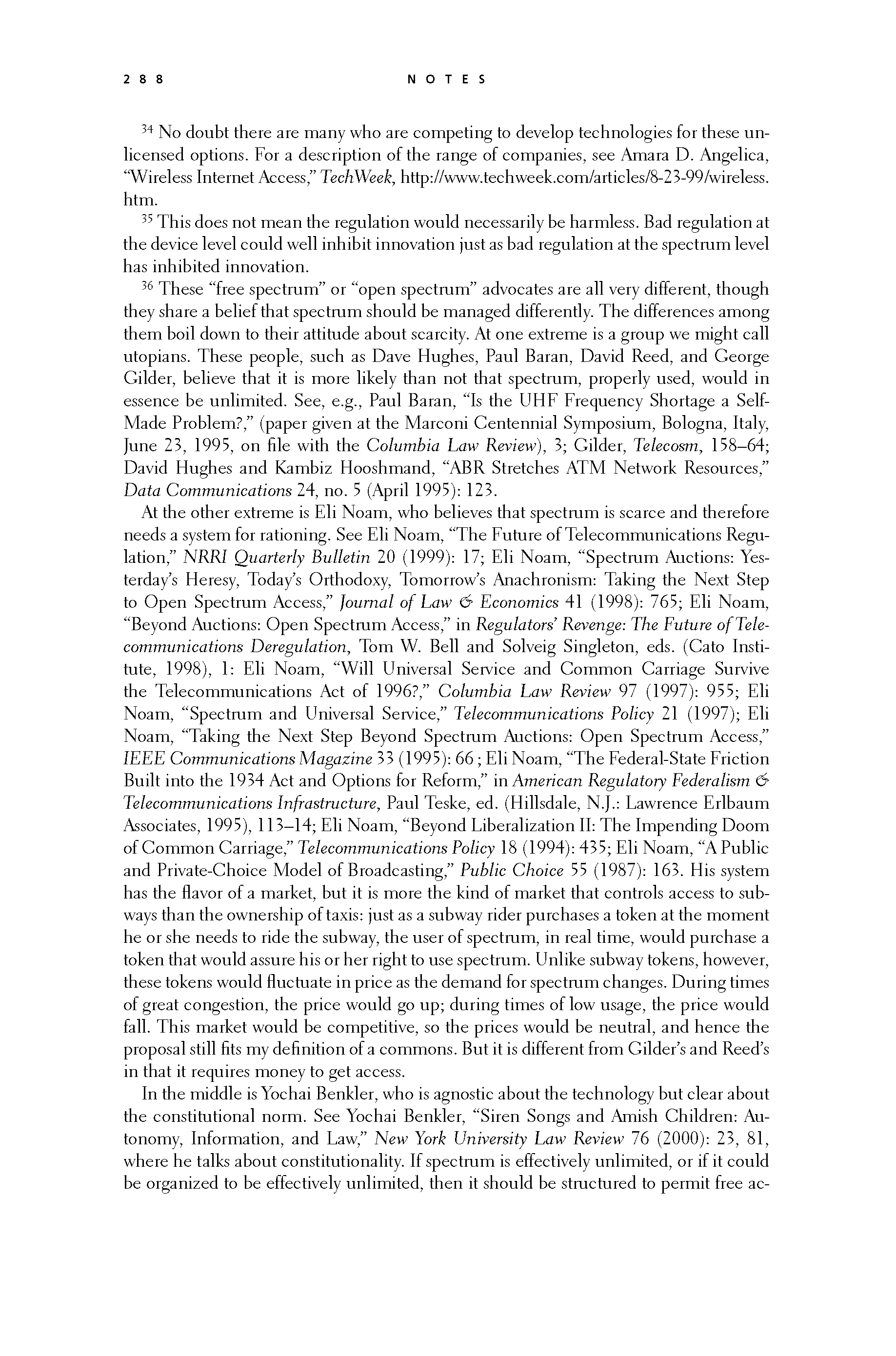 p287 _
-chap- _
toc-1 _
p288w _
toc-2 _
+chap+ _
p289
p287 _
-chap- _
toc-1 _
p288w _
toc-2 _
+chap+ _
p289
[5-34] No doubt there are many who are competing to develop technologies for these un-
licensed options. For a description of the range of companies, see Amara D. Angelica,
"Wireless Internet Access," _TechWeek,_ http://www.techweek.com/articles/8-23-99/wireless.
htm.
[5-35] This does not mean the regulation would necessarily be harmless. Bad regulation at
the device level could well inhibit innovation just as bad regulation at the spectrum level
has inhibited innovation.
[5-36] These "free spectrum" or "open spectrum" advocates are all very different, though
they share a belief that spectrum should be managed differently. The differences among
them boil down to their attitude about scarcity. At one extreme is a group we might call
utopians. These people, such as Dave Hughes, Paul Baran, David Reed, and George
Gilder, believe that it is more likely than not that spectrum, properly used, would in
essence be unlimited. See, e.g., Paul Baran, "Is the UHF Frequency Shortage a Self-
Made Problem?," (paper given at the Marconi Centennial Symposium, Bologna, Italy,
June 23, 1995, on file with the _Columbia_Law_Review_), 3; Gilder, _Telecosm,_ 158-164;
David Hughes and Kambiz Hooshmand, "ABR Stretches ATM Network Resources,"
_Data_Communications_ 24, no. 5 (April 1995): 123.
At the other extreme is Eli Noam, who believes that spectrum is scarce and therefore
needs a system for rationing. See Eli Noam, "The Future of Telecommunications Regu-
lation," _NRRI_Quarterly_Bulletin_ 20 (1999): 17; Eli Noam, "Spectrum Auctions: Yes-
terday's Heresy, Today's Orthodoxy, Tomorrow's Anachronism: Taking the Next Step
to Open Spectrum Access," _Journal_of_Law_&_Economics_ 41 (1998): 765; Eli Noam,
"Beyond Auctions: Open Spectrum Access," in _Regulators'_Revenge:_The_Future_of_Tele-_
_communications_Deregulation,_ Tom W. Bell and Solveig Singleton, eds. (Cato Insti-
tute, 1998), 1: Eli Noam, "Will Universal Service and Common Carriage Survive
the Telecommunications Act of 1996?," _Columbia_Law_Review_ 97 (1997): 955; Eli
Noam, "Spectrum and Universal Service," _Telecommunications_Policy_ 21 (1997); Eli
Noam, "Taking the Next Step Beyond Spectrum Auctions: Open Spectrum Access,"
_IEEE_Communications_Magazine_ 33 (1995): 66 ; Eli Noam, "The Federal-State Friction
Built into the 1934 Act and Options for Reform," in _American_Regulatory_Federalism_&_
_Telecommunications_Infrastructure,_ Paul Teske, ed. (Hillsdale, N.J.: Lawrence Erlbaum
Associates, 1995), 113-114; Eli Noam, "Beyond Liberalization II: The Impending Doom
of Common Carriage," _Telecommunications_Policy_ 18 (1994): 435; Eli Noam, "A Public
and Private-Choice Model of Broadcasting," _Public_Choice_ 55 (1987): 163. His system
has the flavor of a market, but it is more the kind of market that controls access to sub-
ways than the ownership of taxis: just as a subway rider purchases a token at the moment
he or she needs to ride the subway, the user of spectrum, in real time, would purchase a
token that would assure his or her right to use spectrum. Unlike subway tokens, however,
these tokens would fluctuate in price as the demand for spectrum changes. During times
of great congestion, the price would go up; during times of low usage, the price would
fall. This market would be competitive, so the prices would be neutral, and hence the
proposal still fits my definition of a commons. But it is different from Gilder's and Reed's
in that it requires money to get access.
In the middle is Yochai Benkler, who is agnostic about the technology but clear about
the constitutional norm. See Yochai Benkler, "Siren Songs and Amish Children: Au-
tonomy, Information, and Law," _New_York_University_Law_Review_ 76 (2000): 23, 81,
where he talks about constitutionality. If spectrum is effectively unlimited, or if it could
be organized to be effectively unlimited, then it should be structured to permit free ac-
[[288]]
p287 _
-chap- _
toc-1 _
p288w _
toc-2 _
+chap+ _
p289